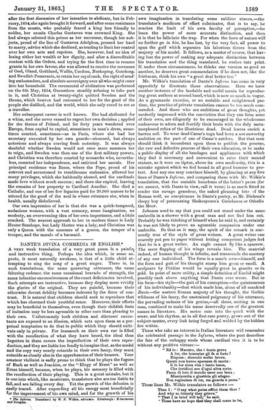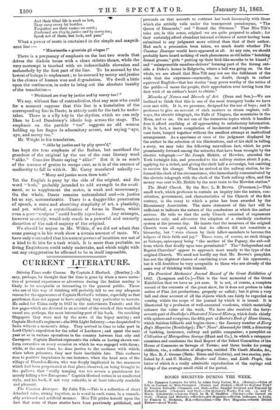DANTE'S DIVINA COMMEDIA IN ENGLISH.*
A VERY weak translation of a very great poem is a painful and instructive thing. Perhaps the idea which, in some as pects, it most naturally awakens, is that of a little child at- tempting to sing the song of a great singer. There is, in such translations, the same quavering utterance, the same faltering cadence, the same occasional bravado of strength, the same infantine unconsciousness of the exact deficiencies involved. Such attempts are instructive, because they display more vividly the glories of the original. They are painful, because their otherwise decent debility becomes indecent by the force of con- trast. It is natural that children should seek to reproduce that which has charmed their youthful sense. Moreover, their efforts may be beneficial to themselves, even though their childish feats of imitation may be less agreeable to other ears than pleasing to their own. Unfortunately both children and dilettanti execu- tants are exposed to an illusion, which acts upon them as a per- petual temptation to do that in public which they should culti- vate only in private. For inasmuch as their own ear is filled with the recollection of what they have heard, the ideal thus begotten in them covers the imperfection of their own repro- duction, and they are liable too fondly to imagine that, as the model and the copy very nearly coincide in their own fancy, they must coincide as closely also in the apprehension of their hearers. Your amateur violinist is sadly prone to think that he plays the fugues of Bach as well as Joachim, or the "Elegy of Ernst" as well as Ernst himself, because, when he plays, his memory is filled with the recollection of their playing. This is a great mistake, but it is one into which, like musicians, translators also are too liable to fall, and are falling every day. Yet the growth of the delusion is easily traced. After expending all his energy most beneficially for the improvement of his own mind, and for the growth of his
• The Inferno. Translatel by W. P. Wilkie, advocate. Edinburgh : Elmonston and Douglas.
own imagination in translating some sublime stanza,—the translator's modicum of effort culminates, that is to say, he
reaches the limit of his own faculty of perception,—he loses the power of more accurate distinction, and then it is that he falls into the trap. For when the force of nature will no further go in him, he has lost, by the very fact, all power to span the gulf which separates his laborious throes from the
majesty of his model. It follows, as a matter of course, that hav- ing lost the power of making any adequate distinction between his translation and the thing translated, he rushes into print_ If, under these circumstances, he thinks one version as good as another, he deserves great commendation if he does not, like the Irishman, think his own " a great deal better too."
Mr. Wilkie's translation of Dante's Inferno has come in very appositely to illustrate these observations. Here we have another instance of the laudable and useful mania for reproduc- ing great authors at second hand, which is now so much in vogue. As a gymnastic exercise, or an amiable and enlightened pas- time, the practice of private translation cannot be too much com- mended. And those who are ambitious of great thoughts, yet modestly impressed with the conviction that they can form none of their own, are diligently to be encouraged in the wholesome endeavour to adorn and fructify their brain with the duly meta-
morphosed relics of the illustrious dead. Dead leaves enrich a. barren soil. To wear dead Cwsar's toga had been a not unworthy ambition on the part of one of Caesar's suttlers. But that men should think it incumbent upon them to publish the process, the raw and defective process of their own education, or to make a public display of all the bandages and appliances with which
they find it necessary and convenient to raise their menta' stature, as it were on tiptoe, above its own mediocrity, this is a mistake against which we feel bound in all good humour to pro- test. And any one may convince himself, by glancing at any five lines of Dante's Inferno, and comparing them with Mr. Wilkie's- translation, that the amiable humdrum of the latter's prose (for we cannot, with Dante in view, call it verse) is as much fitted to- render the savage grandeur, the naked gleaming bite of the
Roman wolf, so conspicuous in Dante's poetry, as Mr. Dickens's sleepy boy of personating Shakespeare's Coriolanus or Othello the Moor.
Johnson used to say that you could not stand under the same umbrella in a shower with a great man and not find him out. Probably he was thinking of himself when he said it, and certainly
he was not likely to prove an agreeable companion under one- umbrella. Be that as it may, the spirit of the remark is emi- nently true of the style of great writers. A great writer can
scarcely put pen to paper without letting competent judges feel that he is a great writer. An eagle cannot fly like a sparrow. The mere flapping of his wings reveals him. The material
indeed, of human thought is infinite, and transcends the mastery of any one individual. The form is a man's own—himself, and the form and gait of his thought stamp him great or small. A
sculpture by Phidias would be equally great in granite or in gold. In point of mere utility, a simple definition of Euclid might possibly rank above anything that Dante ever wrote. But in his form—his style—the gait of his conception—the quintessence of his individuality—that which made him, alone of all mankind
Dante—the austere Roman majesty of his thought, the Gothic wildness of his fancy, the unstrained poignancy of his utterance,
the pervading sadness of his genius,—all these, uniting in one man, combined to make his name deservedly one of the greatest names in literature. His metro cuts into the quick with the sense, and his rhythm, as in all first-rate poetry, grows out of the subject-matter, every link being forged and welded by the hidden fire within.
Those who take an interest in Italian literature will remember
the celebrated passage in the Inferno, where the poet describes the fate of the unhappy souls whose cardinal vice it is to be
without any positive virtues:-
" Ed io : Maestro, che e tanto greve
A tor, che lamentar gli fa si forte ? Rispose : dicerolti motto breve.
Questi non hanno speranza di morte : E la for cieca vita 6 tanto bum,
Che invidiosi son d'ogui altra sorte.
Fama di loro it mondo esser non lases ; Misericordia a ginetizia gli edegna.
Non ragiouiam di tor, ma guarda a passe."
These lines Mr. Wilkie translates as follows :-
Then I: " 0 say what pains afflict them thus And why so bitterly they grieve."
" That I in brief will tell," he said.
These have no hope thit they shall cease to be,
" Misericordia e giustizia gli sdegna !"
There is a pregnancy of emphasis on the last two words that drives the disdain home with a clean stiletto thrust, while the very contempt is touched with an indescribable elevation and melancholy by the first part of the line. To be scorned by the lowest of beings is unpleasant ; to be scorned by mercy and justice is the climax of human woe and d-!gradation. We dwell a little upon the sentiments, in order to bring out the absolute inanity of the translation-
" Disdained are they by justice and by mercy too ! "
We say, without fear of contradiction, that any man who could for a moment suppose that this line is a translation of the corresponding line in Dante, is utterly unfit for the task he under- takes. There is a silly trip in the rhythm, which we can only liken to Lord Dundreary's idiotic hop across the stage. The emphasis on the particle " too" suggests an old woman holding up her finger in admonitory accent, and saying " aye, aye, and mercy too."
Mr. Wright in his translation,
"Alike by justice and by pity spurn'd,"
has kept the true emphasis of the Italian, but sacrificed the grandeur of the original by the use of the cant literary word " alike." Conceive Dante saying " alike !" But it is as much of the essence of genius to escape cant, as it is of the essence of mediocrity to fall in with it. Mr. Carey translated nakedly :—
" Mercy and justice scorn them both."
Yet the English is puny by the side of the original, and the word "both," probably .intended to add strength to the senti. ment, or to supplement the metre, is weak and unnecessary. On the whole, Dante remains untranslated and—in justice let us say, untranslatable. There is a dagger-like penetration of speech, a stern and absorbing simplicity of art, a plasticity, and yet, withal, a crystallization of forms in Dante, which even a poet" sculptor " could hardly reproduce. Any attempts, however masterly, would only result in a powerful and masterly distortion of the naked majesty of the original.
We should be unjust to Mr. Wilkie, if we did not admit that some passages in his work show a certain amount of taste. We have only contended that his natural powers of intuition are not of a kind to fit him for a task which, it is more than probable, no living Englishman could safely undertake, and which might with- out any exaggeration be affirmed to be in itself impossible.
And their blind life is sunk so low, They envy every lot besides. Forgotten are their names on earth ; Disdained are they by justice and by mercy too;
Speak not of them, but look, and pass."
What a power of scorn is contained in the simple and magnifi- cent line :—































 Previous page
Previous page